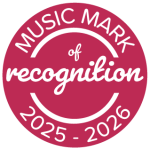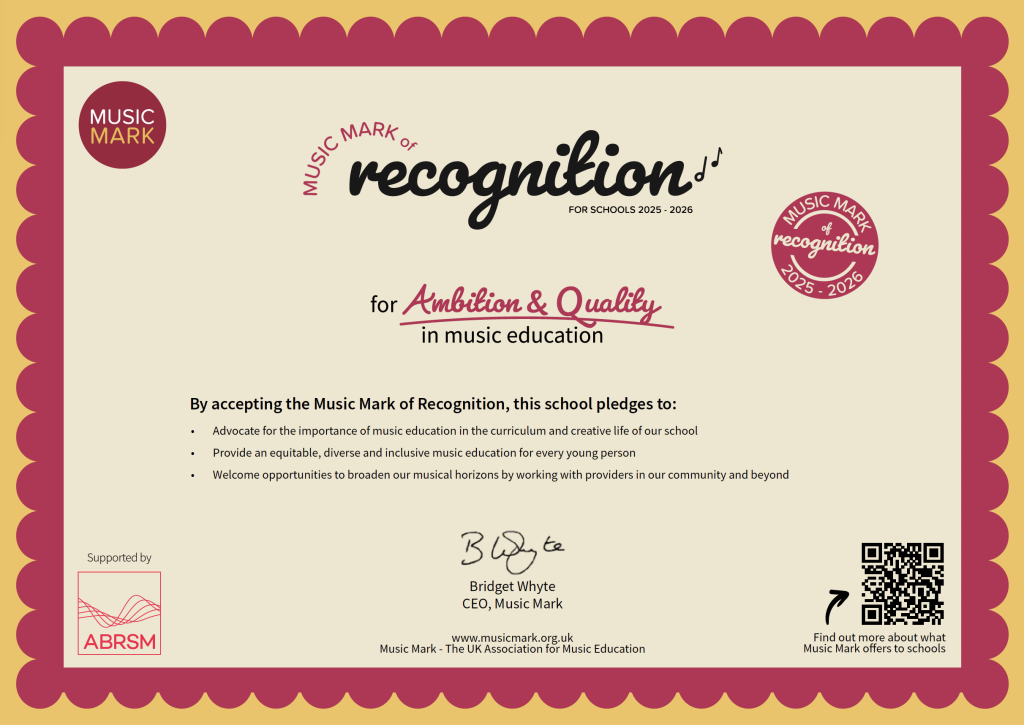
Developing the young musician at Someries Infant School and Early Childhood Education Centre

Music is a universal language that represents one of the highest forms of creativity. Through our music education, we engage and inspire children to develop a love of music and nurture their talent as musicians, boosting their self-confidence, creativity, and sense of achievement. As children progress, we guide them towards a critical engagement with music, enabling them to compose and to listen with discernment to some of the finest works in the musical canon.
Early childhood education curriculum milestones
Developing the knowledge and skills I need to be a successful young musician
The progress of pupils accessing our Early Childhood Education Centre is monitored using our unique curriculum milestone objectives to ensure they are suitably prepared with the foundational knowledge, skills and understanding they require to succeed in key stage one.
I explore a range of sound-makers and instruments and play them in different ways. I explore my voice and enjoy making sounds joining in with songs and rhymes.
I show attention to sounds and music and I also turn towards familiar sounds.
I play instruments with increasing control to express my feelings and ideas.
I can tap out simple repeated rhythms and explore and learn how sounds and movements can be changed.
I can sing the pitch of a tone sung by another person (‘pitch match’). I also listen with increased attention to sounds and show interest to noises.
I can explore and engage with music making and dance, performing solo or in groups. I also can sing in a group or on my own, increasingly matching the pitch and following the melody.
I can listen attentively, move to and talk about music, expressing my feelings and responses. I can listen carefully to rhymes and songs and pay attention to how I sound.
I can also learn rhymes, poems and songs.
I can sing a range of well-known nursery rhymes and songs, performing these as well as poems and stories with others and –when appropriate- try to move in time with music.
I also can make comments about what I have heard and ask questions to clarify my understanding.
Achieving these milestones throughout my early childhood education will support me in accessing my first steps in key stage one because they provide a foundation for me being able to:
- join in with singing songs, rhymes and chants with occasional actions and listen to music
- keep a pulse effectively and to copy back rhythms precisely, also to be able to control a dance scarf in response to listening to music
- play untuned percussion instruments and Boom whackers effectively and follow basic notation, holding a rhythm pattern with confidence
- demonstrate an awareness of the meaning of tempo and dynamics
Key stage one
How children will build on the foundational knowledge, skills and understanding they developed throughout their Early Childhood Education
Throughout key stage one, pupils are taught how use their voices expressively and creatively by singing songs and speaking chants and rhymes. They also learn how to play tuned and untuned instruments musically and how to listen with concentration and understanding to a range of high-quality live and recorded music. A wide variety of planned opportunities enable children to experiment with, create, select and combine sounds using the inter-related dimensions of music.
All pupils receive a weekly music lesson delivered by a specialist music teacher.
Instrument tuition

All Year Two pupils receive whole-class instrumental tuition as part of our music curriculum.
Our instrumental tuition focuses on the toot, bridging the gap between learning to play the recorder and the flute, and the ukulele.
This tuition enables all pupils to be well-prepared for the more formal instrumental lessons they will undertake as part of the Key Stage Two National Curriculum.

Recognition
Music Mark of Recognition for Ambition and Quality in Music Education
Someries Infant School and Early Childhood Education Centre has been awarded the Music Mark of Recognition for Ambition and Quality in Music Education.
This award, presented by Music Mark – The UK Association for Music Education, celebrates the school’s commitment to ensuring that music plays a central role in enriching the learning and cultural experiences of all pupils.
By receiving this recognition, Someries Infant School and Early Childhood Education Centre affirms its dedication to promoting the importance of music education within both the curriculum and the wider creative life of the school. It is committed to providing an equitable, diverse, and inclusive music education, ensuring that every pupil has access to rich and meaningful musical experiences. The school also embraces opportunities to broaden its musical horizons by collaborating with music education providers in the community and beyond, strengthening its role as a high-quality provider of music education.

Saturday Music Centre
Saturday Music Centre is run by Luton Music Service every Saturday during term-time
Mini Music sessions give children aged 5-8 the chance to take their first steps in music.


